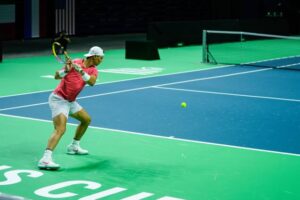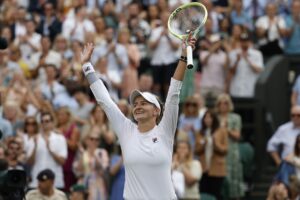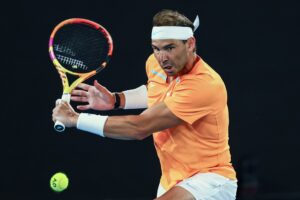I have never liked the notion of a certain sportsperson–whoever he or she might be–transcending the sport he or she played. A sportsperson can enrich the sport, can take the excellence achieved in it to another level, can make it more popular globally, but he cannot be greater than the sport itself. None is bigger than the sport.
A lot of people cite the examples of the likes of Muhammad Ali, Pele, or Michael Jordan as people who have transcended the sports they played. However, on closer introspection, one might notice that Ali merely used the fame achieved as a sportsperson to make political statements, Jordan elevated the popularity of basketball to another level, and Pele merely became the greatest example of the sport that was already the most popular one in the world.
While that debate might continue, there is no debate as regards the fact that Roger Federer belongs to the above group of players: players who have taken their sports to another level with their skill, consistency and–if I may add–artistry. The retirement was impending, and could have come even earlier, but Federer’s legacy will live on forever undoubtedly.
Brilliance as a player:
The stats speak for themselves as far as the 41-year-old Swiss maestro is concerned: 20 Grand Slam titles, 28 Masters 1000 titles, six Year-end Championships, 103 career titles, 310 weeks as World no. 1, the list goes on. Moreover, Federer is the only player to have won five consecutive Wimbledon as well as US Open titles. He is quite probably the greatest grass court player of all time–though Pete Sampras would have to be mighty close–and also the greatest ever player on faster hard courts, again rivaled by Sampras and Novak Djokovic in that aspect.
Federer is right up there in terms of his playing style and shot-making as well. His serve is among the best of all time and his forehand is quite possibly the most elegant and effective shot of all time. Add to that his volleying skills and ability to play serve-and-volley, and you have an all-court genius, who can thrive in almost any playing condition. Despite having an aggressive style of play, Federer has adjusted himself according to the changed playing conditions of his era and remained primarily a baseliner to remain relevant on the slowed down surfaces.
However, where Federer scores above his rivals is the sheer delight he provides to the spectators and tennis experts alike. He has been the most popular tennis player in the world for the last 15 years, at least, because of his aggressive approach and elegant playing style. He had the right mix of power and touch that set him apart from the others. For example, in an era inundated with players with two-handed backhands, Federer kept hitting his one-handed backhand, which remains an underrated shot, and also made some changes to it with great results towards the latter stages of his career.
Enjoying great rivalries:
No tennis great is complete without great rivalries enjoyed with his rivals and Federer is no exception. He shared great rapport with Rafael Nadal on and off the pitch and another great one on the pitch, but not so great off it, with Novak Djokovic. He trails the head-to-head against both of his great rivals, 16-24 and 23-27, respectively. However, Nadal was always a bad match-up for his, as the Spaniard’s forehand containing a great amount of top spin exploited Federer’s backhand to a great extent, especially on the high-bouncing clay courts.
Still, it was a testimony to Federer’s greatness that he made subtle changes to his backhand and racquet to improve his record against Nadal during the latter stages of his career, which included the memorable win in the final of the 2017 Australian Open.
If the intense and super-athletic Nadal was an antithesis of Federer on a physical level, the relentless Djokovic proved to be his perfect adversary in a deeper way. Djokovic is like a machine, to borrow the cliché, who keeps retrieving and returning balls in a super-efficient way and whose relatively bland playing style cannot take away from the fact that he is the most consistent player the game has ever seen. Djokovic was the Lothar Matthaus to Federer’s Diego Maradona–to draw an instance from soccer–a rival who always tried to nullify his greatness with his relentless, if somewhat robotic, efficiency. Federer’s loss to Djokovic in as many as three Wimbledon finals, including the heartbreak of the 2019 final that saw him squander a couple of match points, has hurt his legacy somewhat.
Those two great rivals along with the likes of Andy Murray ensured that Federer could only win five Grand Slam titles during the last 13 years of his career. However, the spectators were not complaining as they were treated by some immortal clashes over the years. One might also ponder to think as to what would have happened if the surfaces remained as versatile and as they were in the ’90s and not homogenized to suit a certain style of play. Still, it is undeniably true that the “Big Three” have together formed the golden era of tennis with their consistency and longevity.
Matches to remember:
There have been a plethora of matches featuring the Swiss great, which will forever remain etched in the memories of tennis lovers. The 2017 Australian Open final has already been mentioned, and the Wimbledon finals against Nadal in 2007 and 2008 were amazing, too.
However, I would like to mention a couple of Federer’s matches which happened slightly before he became a household name. He won one of those matches and lost the other one. The first was the Wimbledon quarterfinal against Sampras that he won in five sets. To beat the champion on his favorite hunting ground was the thrust Federer’s career needed at that point. It was also the proverbial passing of the baton as far as supremacy in tennis was concerned. It was the moment when one champion started to make way for another and I was one of the many fortunate people who watched the match live on TV.
The second match was one of the finest ever, and saw Marat Safin beat Federer in a five-set thriller in the semifinal of the 2005 Australian Open. Federer matched the hugely-talented Russian stroke for stroke from the baseline and he only lost the match in the end because somebody had to lose. Safin went on to win the tournament, but it is the semifinal everyone remembers and I was again fortunate to watch it live on TV.
Main Photo from Getty.





